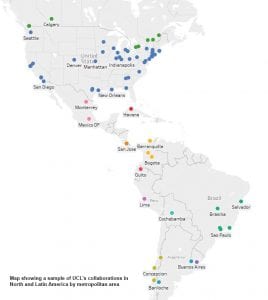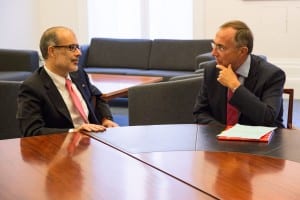Ask GEO: Rachel Hall, Senior Partnership Manager (Americas)
By Sophie Vinter, on 29 November 2017
 Rachel Hall is GEO’s Senior Partnership Manager for North and Latin America.
Rachel Hall is GEO’s Senior Partnership Manager for North and Latin America.
Q: Tell us more about your role and activity in your regions.
A: I joined GEO in August 2017 as Senior Partnership Manager for North and Latin America. Previously I was working at the Faculty of Population Health Sciences. My background is in Latin American studies and I studied an MA at UCL Institute of the Americas. My role is to develop and manage partnerships in the Americas region and a key focus is to try and map all of the collaboration that exists at UCL within North America and Latin America.
My main focus at the moment is an emerging partnership with the University of Toronto which is developing well, and facilitating different activities under this partnership. Recently we announced the winners of the first UCL-UofT funding stream, which will support some great projects in the areas of child health, education and cities, among others.
I’m also looking at building on the existing links we have with Yale and NYU. In Latin America, we are focusing on Mexico and Chile and supporting our partnership with Santander Universities and the many schemes offered under our agreement with them, such as the Research Catalyst Awards which will open next month.
Q: How are you finding the role?
A: I think the Global Engagement Strategy is great for UCL and I like how the GEO team is constantly reviewing our work, which is the nature of working with partners. We’re looking at the implementation and evaluation of our strategy and I think partners appreciate success stories and case studies of our work together – a good example of this is our ongoing partnership with Santander Universities. In my first month GEO welcomed the CEO of Santander to an event celebrating ten years of our partnership. It’s nice to now be working across the university in the full range of subjects too.
Q: What’s top of your to do list at the moment?
A: In January Provost will be welcoming the President of the University of Toronto to discuss the development of our partnership, so I am currently preparing for that. We recently set up a UCL-UofT working group that meets termly to oversee activities as we develop how we work together.
In Latin America, we’ve just announced that Dr Deepak Kalaskar (UCL Biomedical Engineering) is a successful recipient of the the UK-Mexico Visiting Chair Scheme, which offers UCL academics a great opportunity to develop links in Mexico. He’ll be collaborating with the Autonomous University of Nuevo León.
I’m always mapping more collaborations in both regions and actively pursuing leads – so if you are a UCL academic collaborating in the Americas, please get in touch as I’d love to hear about your work!
Q: How can academics find out more about UCL activity in the regions?
A: I work closely with UCL’s Pro-Vice-Provosts for North and Latin America, Professor Brad Karp and Professor Alejandro Madrigal, to develop our regional networks.
For Latin America we’re planning to hold a meeting in January to discuss new ways we can harness our shared interest in the region to leverage funding. I’d be really keen to hear from any UCL academics who are currently collaborating in Chile and Mexico as a priority. We’re also looking to broaden our partnership with Yale University and will be reaching out to the academic community over the next few months, to see where potential opportunities lie.
Q: Can you tell us a fact about either region that may surprise people?
A: Jeremy Bentham’s auto-icon is visiting the New York Metropolitan Museum next year, as part of some work being led by UCL Culture and OVPD!
 Close
Close















